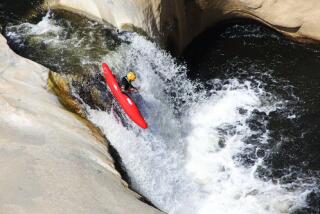Lake Piru’s Tragic Toll
PIRU — The skies were sunny and the winds calm at Lake Piru when Eric Cruz decided to swim the short distance to his stalled radio-controlled model boat.
But the inexperienced swimmer struggled just short of the boat and panicked, witnesses said, pushing away his boogie board. Divers retrieved his body an hour later.
The 25-year-old Van Nuys resident had drowned only 10 feet from shore.
Cruz, whose body was found on the floor of the lake Tuesday afternoon, was the seventh person to drown in Lake Piru since 1994.
In August of that year, 27-year-old Jesus Danilo Carranza of North Hollywood drowned while on an outing with his family, even though he was wearing a life jacket.
In July 1997, Liborio Dominguez of Long Beach drowned while trying to rescue his young daughter. The girl was saved, but Dominguez’s body was not discovered until several days later.
On Sept. 1, 1997, 22-year-old Isidro Castillo of Newhall encountered problems while swimming and called for his girlfriend to throw him a buoy. But the woman was unable to get the flotation device to him. His body was found a day later.
On Sept. 30, 1997, rescue workers recovered the body of 30-year-old Port Hueneme resident Ulises Anthony Mendoza, who was last seen struggling days earlier while swimming with family members near their boat.
In February 1998, Lake Piru employee Arthur Raymond Caladara was found drowned near a dock. The details of his death are unknown.
And in June, the body of 30-year-old Vy Xuan Dang of Garden Grove, who disappeared while swimming with his family during the Memorial Day weekend, was found by a park ranger.
Douglas West, Lake Piru’s parks and recreation services manager, said there have been about a dozen drownings during his 23 years at the lake. Most victims are inexperienced swimmers who are not wearing life jackets and who overestimate their own abilities or swim in prohibited areas.
*
A poor swimmer or nonswimmer making a decision to wade in or jump off a boat--even in an attempt to save someone else--baffles West and other park officials.
“We don’t understand why someone would jump out of a boat into the water if they didn’t know how to swim,” West said.
Sheriff’s spokesman Eric Nishimoto said currents on the lake were strong Tuesday. And after a 1997 drowning, park officials speculated that wind gusts and deep columns of chilly water on the lake, which is up to 160 feet deep depending on the time of year, can overtake swimmers quickly.
“I know it can get rough out there,” Nishimoto said.
But West said conditions on the 1,200-acre reservoir are no different than at similar lakes, and Piru’s statistics for drownings are slightly lower than those of Pyramid Lake and Castaic Lake, which have comparable use. Rangers alert boat operators when conditions are bad, he said.
Most drowning victims were swimmers venturing into restricted waters, he said.
Staff at the lake, including rangers and lifeguards, fluctuates from 10 to more than 30, depending on the season, West said. Lifeguards are on duty at the lake’s designated swimming beach on weekends, busy days and most of the summer.
But no lifeguards were on duty Tuesday because the Labor Day holiday crowd had departed and only about 20 visitors were at the lake, he said.
On slow days, the park’s rangers, all trained as lifeguards and emergency medical technicians, try to spot swimmers in trouble. But on Tuesday, Cruz was too far from anyone else, in an area marked as off-limits to swimming.
*
After a drowning, park officials meet to discuss the situation and determine what can be done to improve their response.
On Wednesday, they came to the conclusion that Cruz’s drowning could have been prevented if he had worn a life jacket or other flotation device.
West cautioned that the lake’s swimming beach is clearly marked and other parts of the lake are posted off-limits to swimming for grim reasons.
“The only thing I can emphasize is that if swimmers are around water, they need to wear a personal flotation device whether they know how to swim or not,” he said. “That will save their lives.”
*
Times staff writer Tina Dirmann and Times Community News reporter Holly J. Wolcott contributed to this report.
More to Read
Sign up for Essential California
The most important California stories and recommendations in your inbox every morning.
You may occasionally receive promotional content from the Los Angeles Times.










